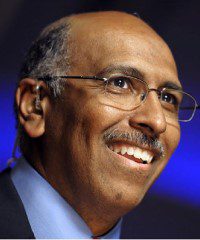Polarization in Politics: Political Veterans Weigh in on Democracy and the Road to Bipartisanship
September 20, 2021 |
 |
In your opinion, what is the overall health of the U.S. democracy today?
ROBERT C. O’BRIEN: Our democracy is strong and resilient. We have been through many turbulent times since our founding, including a fragile start to the nation under the Articles of Confederation, a Civil War, World Wars, the Great Depression and the 1960s. Recent events in America have been trying but the genius of the Founders and the strength of the Constitution have been proven over and over again. American democracy will persevere through the current polarized political climate. I like to tell people to “never bet against the United States.”
MICHAEL STEELE: Democracy is only as healthy as her people; and I would say we’re not feeling too well at the moment. When the people stop believing in the promise of America; when they find solace in conspiracies and lies, demagogues, and
weak leadership there is a sickness which is more profound than we may realize and it affects all of us. Recovery comes when we demonstrate we are willing to hold ourselves and each other accountable – first for the sickness, and then for how we recover as one people.
Given the internal push and pull to the left and right in both parties, what do you think about the sustainability of the two-party system?
RO: The two-party system in America is entrenched and durable. We do not have proportional representation in our Congress like most Europeans or the Israelis do, so the likelihood of a Green Party or far right party emerging and making an impact in Congress is small. There have been viable third-party presidential contenders in the past such as Teddy Roosevelt’s Bull Moose comeback attempt or Ross Perot’s two runs in the 90s, but those movements did not out last their charismatic leaders.
MS: The current state of the two-party system is unstable at best; certainly, it is changing as the priorities of both parties are shifting closer to the political extremes. We have witnessed both parties deconstruct democratic principles through vacuous soundbites, fundraising off crass behavior and rhetoric, appeals to tribalism and no accountability. Now we know why many of the Founders were less than enthusiastic about the formation of political“factions”.
Is there a path to a more bipartisan political climate in the U.S., if so, how do we get there?
RO: We need to return to being friends with each other. The idea that friends or families would split over politics is very sad. We must emphasize our American identity before we move on to our political identity. When I was an 18-year-old intern at the RNC in Washington, the first call I received on the job was from my Democratic hometown Congressman, Doug Bosco. He welcomed me to DC and invited me to attend all of his office’s intern program events. I have never forgotten Doug’s kindness. We need more of that type of reaching across the aisle today.
MS: We will get on the path to bipartisanship when we decide that “bipartisanship” is not a dirty word. Until we not only recognize its value to the body politic but are willing to use its tools as a legitimate means of governing ourselves, we will continue to find ourselves mired in a cesspool of lackluster leadership, poor results, and just bad politics.
